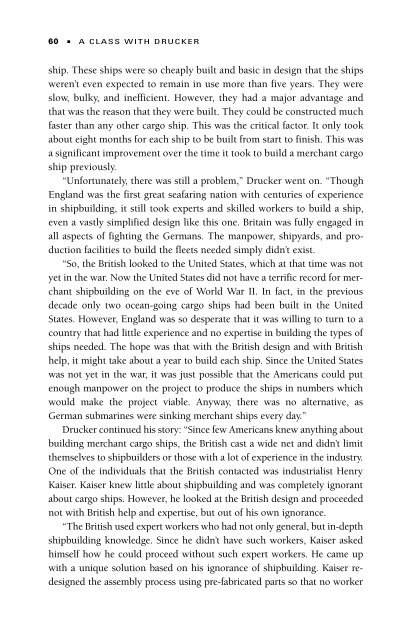A Class with Drucker - Headway | Work on yourself
A Class with Drucker - Headway | Work on yourself
A Class with Drucker - Headway | Work on yourself
Create successful ePaper yourself
Turn your PDF publications into a flip-book with our unique Google optimized e-Paper software.
60 ■ A CLASS WITH DRUCKER<br />
ship. These ships were so cheaply built and basic in design that the ships<br />
weren’t even expected to remain in use more than five years. They were<br />
slow, bulky, and inefficient. However, they had a major advantage and<br />
that was the reas<strong>on</strong> that they were built. They could be c<strong>on</strong>structed much<br />
faster than any other cargo ship. This was the critical factor. It <strong>on</strong>ly took<br />
about eight m<strong>on</strong>ths for each ship to be built from start to finish. This was<br />
a significant improvement over the time it took to build a merchant cargo<br />
ship previously.<br />
“Unfortunately, there was still a problem,” <str<strong>on</strong>g>Drucker</str<strong>on</strong>g> went <strong>on</strong>. “Though<br />
England was the first great seafaring nati<strong>on</strong> <str<strong>on</strong>g>with</str<strong>on</strong>g> centuries of experience<br />
in shipbuilding, it still took experts and skilled workers to build a ship,<br />
even a vastly simplified design like this <strong>on</strong>e. Britain was fully engaged in<br />
all aspects of fighting the Germans. The manpower, shipyards, and producti<strong>on</strong><br />
facilities to build the fleets needed simply didn’t exist.<br />
“So, the British looked to the United States, which at that time was not<br />
yet in the war. Now the United States did not have a terrific record for merchant<br />
shipbuilding <strong>on</strong> the eve of World War II. In fact, in the previous<br />
decade <strong>on</strong>ly two ocean-going cargo ships had been built in the United<br />
States. However, England was so desperate that it was willing to turn to a<br />
country that had little experience and no expertise in building the types of<br />
ships needed. The hope was that <str<strong>on</strong>g>with</str<strong>on</strong>g> the British design and <str<strong>on</strong>g>with</str<strong>on</strong>g> British<br />
help, it might take about a year to build each ship. Since the United States<br />
was not yet in the war, it was just possible that the Americans could put<br />
enough manpower <strong>on</strong> the project to produce the ships in numbers which<br />
would make the project viable. Anyway, there was no alternative, as<br />
German submarines were sinking merchant ships every day.”<br />
<str<strong>on</strong>g>Drucker</str<strong>on</strong>g> c<strong>on</strong>tinued his story: “Since few Americans knew anything about<br />
building merchant cargo ships, the British cast a wide net and didn’t limit<br />
themselves to shipbuilders or those <str<strong>on</strong>g>with</str<strong>on</strong>g> a lot of experience in the industry.<br />
One of the individuals that the British c<strong>on</strong>tacted was industrialist Henry<br />
Kaiser. Kaiser knew little about shipbuilding and was completely ignorant<br />
about cargo ships. However, he looked at the British design and proceeded<br />
not <str<strong>on</strong>g>with</str<strong>on</strong>g> British help and expertise, but out of his own ignorance.<br />
“The British used expert workers who had not <strong>on</strong>ly general, but in-depth<br />
shipbuilding knowledge. Since he didn’t have such workers, Kaiser asked<br />
himself how he could proceed <str<strong>on</strong>g>with</str<strong>on</strong>g>out such expert workers. He came up<br />
<str<strong>on</strong>g>with</str<strong>on</strong>g> a unique soluti<strong>on</strong> based <strong>on</strong> his ignorance of shipbuilding. Kaiser redesigned<br />
the assembly process using pre-fabricated parts so that no worker


